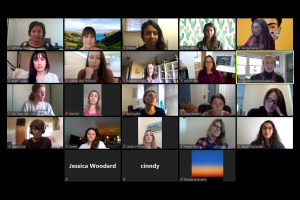Building Resilience in the Face of Adversity
By Ruby Tumber, WEN board member
As we fill up our schedules with FaceTime, Google Hangouts, and Zoom it only makes sense that Women’s Environmental Network (WEN) would host another virtual event. Thankfully, it wasn’t a compulsory call with a pesky aunt — or another work team meeting before you’ve had your requisite tankard of coffee — but a coming together of women throughout the Bay Area and beyond to discuss a topic more salient than ever: resiliency.
WEN held our first virtual Storytelling Salon on May 12, following the 2019 ‘live and in person version.’ As we began the year, the topic of resilience was at the forefront of our minds — but we couldn’t have foreseen that we would become a living case study on its meaning. Because the international COVID-19 pandemic has forced us to shelter in place, we decided to hone in on the topic by highlighting stories of resilience.
Resilience takes many forms, and we wanted to highlight various aspects of it, whether it be personal, communal, or environmental. To aid in this endeavor, WEN invited four dynamic women to share their own stories of resilience:
- Lindsay Jean Thompson: Co-founder of Women Catalysts
- Elizabeth Bagley: Director of Drawdown Learn
- Amy Hutzel: Deputy Executive Officer at the California State Coastal Conservancy
- Sandy Naranjo: California Organizing Manager, Mothers Out Front
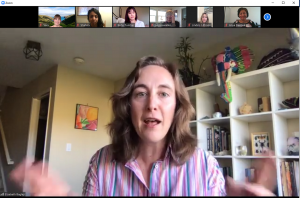
Elizabeth Bagley
From stories of overcoming cancer to extolling the importance of coastal restoration, each shared very different frames of reference when it came to resilience. Elizabeth Bagley shared her perspective on the importance of diversity, and how it breeds resilience. “Resilience asks us how natural systems and humans can change and persist at the same time,” she says. As a scientist, she stressed the significance of allowing a system to probe its boundaries; by doing so it evolves and becomes stronger. This idea extends beyond heterogeneity in a species trying to adapt to a habitat — it’s a concept that can be applied to human communities as well.
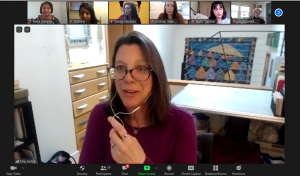
Amy Hutzel
Amy Hutzel described resilience from an environmental perspective, sharing the importance of exploring new mediums of resiliency that differ from traditional ones. Specifically, she described a need to move away from sea walls and levies — inert and vulnerable means of protecting shorelines — and create living tidal marshes, estuarial eelgrasses, and oyster beds — to adapt to sea level rise and create opportunities for human co-benefits. “Tidal marshes take time to appreciate; there’s a lot hidden below the surface,” she says.
Lindsay Jean Thompson and Sandy Naranjo shared deeply powerful perspectives on personal and community resilience. Thompson noted similarities between undergoing treatment for cancer and mandated sheltering in place. “Resiliency is increasing our capacity to be with and work with whatever there is,” she says, adding, “Resiliency is the best competency.” A mantra of her cancer support group can be adopted for our current times: “Remember you’re always OK, even when you’re not OK.” She also shared her belief that society will now become more empathetic toward those who must shelter in place every day, due to illness or accessibility limitations.
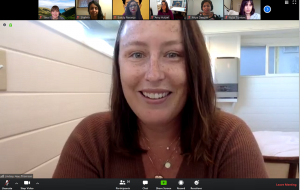
Lindsay Jean Thompson
Naranjo shared her story of being rushed at age three to the emergency room in her hometown, San Ysidro, with an asthma attack, and how it informed her current involvement in activism to protect frontline communities — mostly people of color — from the harmful health impacts of oil and gas drilling and refining.
She has become acutely aware of the power of love and how it can knit people together. “When I think of resilience, I think of love,” she says, having observed moms and grandmoms working for environmental justice even where there are language and societal barriers. “It’s always women bringing everyone together in an issue, whether they get credit for it or not,” Naranjo observes. She believes a more resilient society is created by strengthening the fabric among families, communities, and other social groups with love and empathy. This ethos of community organizing and environmental justice have shaped her work with Mothers Out Front, in which she aims to galvanize families and communities in the fight against climate change.
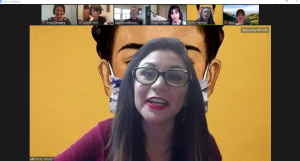
Sandy Naranjo
After our four storytellers shared their stories, the focus shifted to the other event participants. Breakout rooms allowed everyone to share her own stories of resilience and discuss how to continue nurturing it, even in our current circumstances.
In spite of the fatigue of living in a virtual-meeting world, our event reinforced the need to foster ties in trying times. It served as a reminder that adversity makes us stronger not only as individuals, but as a community.

